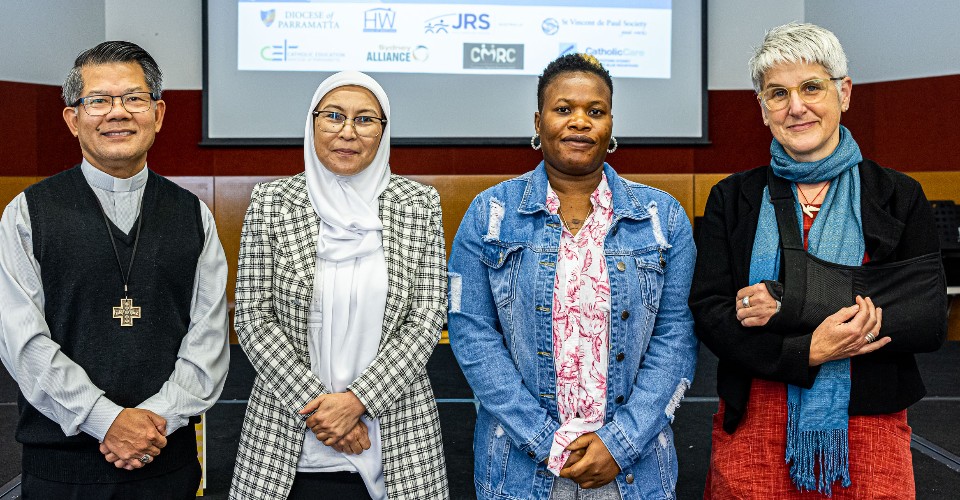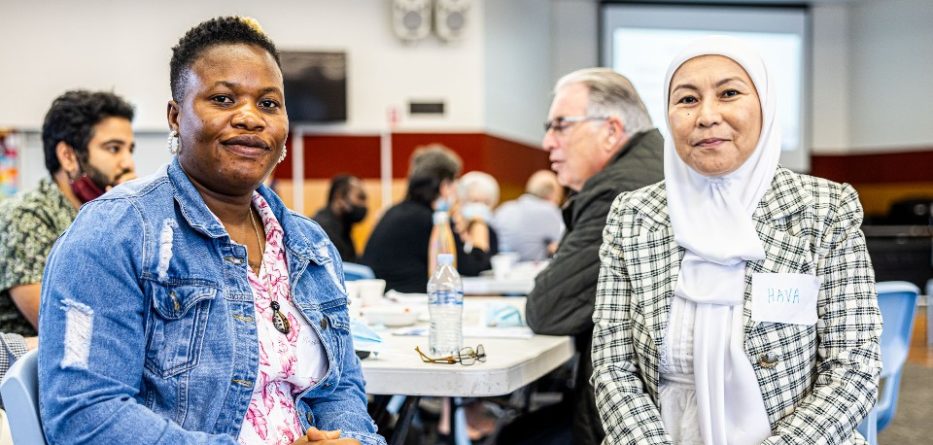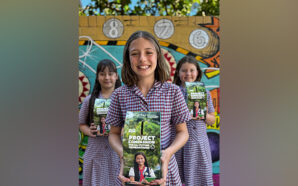Many people’s first reaction when contemplating the refugee situation in our society is to be overwhelmed.
With over 82 million refugees worldwide, and in the face of the current punishing policies by the Australian government, speakers at the recent Diocesan Leaders Conversation “Walking with Refugees and People Seeking Asylum” acknowledged the enormous size and scope of the issues facing refugees.
Despite this, the participants who attended the event held Saturday 26 March at St Andrew’s Primary School and St Andrew the Apostle Parish Marayong, heard there are moments to be celebrated, and action, particularly by the Catholic community, can make a difference. The audience included members of the Curia, many parish priests and parishioners, members of the Diocesan and Deanery Pastoral Councils, and representatives of diocesan and partner agencies.
Blackheath parishioner David Buckley, one of the founding members of the Diocese of Parramatta refugee action network “Diocesan Journey… Walking with Refugees”, which organised the event, challenged the participants “How can we do more as a diocese?”, explaining it is his firm belief that a united voice by Catholics in Western Sydney and the Blue Mountains can bring about change.
Country Director of Jesuit Refugee Service Australia, Tamara Domicelj, and keynote speaker of the event outlined acts of humanity taking place, including parish food drives to support the refugees in Western Sydney who lost their source of income due to the pandemic, and prams or toys left at stations for fleeing Ukraine parents and families.
“All of this local engagement – these human-to-human acts,” said Tamara, “are an increasingly prominent part of a global fabric of determined goodwill which I believe is gaining strength in these volatile and harrowing times.”
At the same time as local engagement, Tamara reminded attendees that there are global conventions in place, that should they be applied, could alleviate a large part of the suffering that refugees experience as a result of having to leave their homes.
Australia was amongst the majority of nations that affirmed the Global Compact on Refugees, said Tamara, explaining that the Compact, signed in 2018, calls for a whole of society approach to refugees to give them lasting protections.
“And, over 70 years ago, it was Australia’s signature, the 6th amongst nations, which brought the International Refugees Convention into effect, as the enduring cornerstone of global refugee policy,” she said.
In more recent years, the treatment of refugees in Australia has deteriorated with offshore detention, “Our mandatory indefinite immigration detention policies see us currently detaining people for an average of 689 days, compared with the US average of 55 days (still too long) and Canada’s of 14,” Tamara explained.

Bishop Vincent Long OFM Conv, Bishop of Parramatta with, from left Hava, Magdalene and Tamara Domicelj. Image: Diocese of Parramatta.
Joining Tamara as guest speaker was Bishop Vincent Long OFM Conv, Bishop of Parramatta. He spoke of his joy that recently the Australian government has decided to implement a deal with New Zealand, first proposed nine years ago, to take a number of refugees from Australian offshore detention to be settled in that country.
“It was due, in a large part to the pressure of people such as yourself,” he told the audience, although encouraging them not to “rest on their laurels” as the arrangement neglected many refugees in PNG, Nauru and even the Park Hotel in Victoria, which came to light during the Novak Djokovic controversy in January 2022.
Having refugees “Out of sight, out of mind” was a blight on Australia’s “illustrious tradition of welcoming refugees,” said Bishop Vincent, who himself arrived in Australia as a refugee from Vietnam.
Bishop Vincent called on Catholics to follow the example of the early Christian community describing how their example sowed the seeds for change. “They became counter-cultural,” he said. “They showed it was possible to live with passion, concern and communion.”
Bishop Vincent and Tamara also spoke about where they felt attitudes in the community may be headed as seen by the New Zealand deal, the public responses to scenes of Afghans trying to flee the Taliban, and the strong support for the Ukrainian people. They agreed that Australian politicians may be realising that the Australian people want a more humane response to refugees.
Attendees also heard first-hand what it is like to be a refugee in Australia.
Magdalene is a former journalist from Sierra Leone and currently seeking asylum in Australia, after fleeing her home country when she was attacked and beaten for speaking out against the practice of female genital mutilation in that country. She refuses to keep quiet about this cruel practice and continues to receive threats should she ever return home. She has experienced homelessness and is still waiting for her application to be progressed after four years. She explained, “When you start as a refugee you start from zero.”
Hava Rezaie, a Hazara community leader from Afghanistan within the Hazara diaspora in Australia and former government official in Afghanistan, explained how the Taliban would go from house to house searching for activists such as herself. Having escaped in 2013, she also refuses to be silenced about the situation in Afghanistan under the Taliban, and the way refugees are treated in Australia.
Parish priests who attended the event expressed their concern and support for refugees, as well as their support for parishioners who wish to become involved in social justice.
Fr Kevin Medilo from Marayong parish, whose vibrant social justice group co-hosted the event, described how many in the group have made a deliberate decision to “live the faith” through becoming involved in social justice. “They are aware of the blessings they have in Australia,” he said.
Fr Ephraim Lam from St Monica’s Parish. North Parramatta, explained that many in his parish have some connection to refugees and he would be supportive of parishioners initiating social justice initiatives around this.
“My father was a refugee,” he said. “During World War II he fled from China to Hong Kong. At that moment (in history) it was a welcoming experience.”
“I would like to see that in Australia,” he said.
The Diocesan Leaders Conversation was the first face-to-face event for the “Diocesan Journey… Walking with Refugees” group since the lifting of COVID restrictions. More events are planned for the coming months and will be advertised on the Diocese of Parramatta’s social media accounts.
View images from the event here.
Musician Pat Drummond from Medlow Bath, who performed his song Who is that refugee?, has offered to perform at fundraisers that parishes in the Diocese of Parramatta may wish to hold to support refugee action. You can listen to the song on YouTube and contact Pat through his website patdrummond.net for details.
If you wish to take other forms of action, please refer to the following overview that was shared with all participants: Ideas for Taking Action. To ensure comprehensive implementation of these ambitious actions across the parishes and schools in our Diocese, our Walking with Refugees Team needs more help. Anyone across the Diocese, agencies, parishes and schools who would like to join this team, please contact Sebastian Salaske-Lentern, Diocesan Peace, Justice and Ecology Coordinator at Sebastian.Salaske-Lentern@parracatholic.org
The House of Welcome, which is located in the Diocese of Parramatta and supports refugees catered for the event. Details here.








